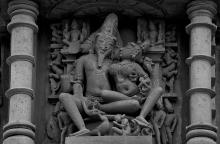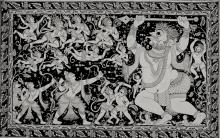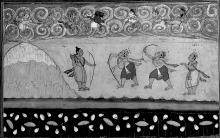Lolla Lakṣmī-dhara (15th–16th cen. CE) was a scholar-poet in the court of Kṛṣṇa-deva-rāya. He is well-known as the author of Lakṣmī-dharā, arguably the best available commentary on Saundarya-laharī. The tenets of Śrī-vidyā are said to be extremely esoteric. They are to be learned through a Guru alone. Lakṣmī-dhara took a bold stand in his work by proclaiming, “I hereby declare myself as the Guru of all honest seekers of present and future!”[1]
Author:shashikiran
Introduction to books
I have mentioned above that Ramanna made me read Kannada Rāmāyaṇa, Bhārata and other books regularly. Bhāgavata and Ranganātha-rāmāyaṇa - both these books were very dear to him. He had many poems from Āndhra Rāmāyaṇa committed to memory. He used to quote them at times during many conversations. Once a Vaiśya[1] came to visit him. Ramanna asked (in Telugu) :
“What made you come? It has been a long time since I last saw you.”
Naiṣadhīya-carita is considered the touchstone of scholarly poetry. Śrī-harṣa (12th cen. CE), its author, takes delight in proclaiming that he composed this work to ward off lesser mortals:
ग्रन्थग्रन्थिरिह क्वचित्क्वचिदपि न्यासि प्रयत्नान्मया
प्राज्ञम्मन्यमना हठेन पठिती मास्मिन् खलः खेलतु।
श्रद्धाराद्धगुरुश्लथीकृतदृढग्रन्थिः समास्वादय-
অর্জুনকে শোক থেকে বিরত থাকার জন্য অনুরোধ করে কৃষ্ণ গীতার সূচনা করেন – “জীবিত বা মৃত, কারোর জন্য অশ্রুপাত করনা” (ভ. গী. ২.১১)। এবং তিনি গীতার পরিসমাপ্তিও করেন অর্জুনকে শোক থেকে বিরত থাকার জন্য অনুরোধ ক’রে – “আমার উপর বিশ্বাস রাখ। আমি তোমাকে মোক্ষ প্রদান করব। তুমি কেঁদো না” (ভ. গী. ১৮.৬৬)। ক্রন্দন থেকে বিরত থাকার এই দুটি মন্ত্রণার মাঝেই তিনি গীতার সমস্ত শিক্ষাদান করেন। কিন্তু কৃষ্ণ তাঁর নিজের জীবনে কি কখনও অশ্রুপাত করেছেন ?
Duṣyanta – “Listening to the story you just narrated confirms that you indeed are a princess from a royal lineage. Please be my wife! Tell me what you desire to have! Golden necklaces, clothing, earrings, bangles, gems and gold coins – I will give them all. My entire kingdom will be yours. Please be my wife. Let us get married through gāndharva-vivāha. It is the best among the various kinds of marriages.”
Śakuntalā – “O King! My father is gone to fetch fruits. Once he comes back, he will hand me over to you!”
Footprints of Scholarly Temerity
ಆ ರಥದ ಸ್ವರೂಪದ ವಿವರಣೆಯನ್ನು ಓದಿದ ಮೇಲೆ ರಥ ಎಂದರೆ ಹೇಗಿರಬಹುದೆಂಬ ಬೃಹತ್ ಕಲ್ಪನೆ ನಮ್ಮ ಮುಂದೆ ಸುಳಿಯುತ್ತದೆ.
ಅರಸ ಕೇಳೈಹತ್ತು ಸಾವಿರ-
ತುರಗನಿಕರದ ಲಳಿಯ ದಿವ್ಯಾಂ-
ಬರದ ಸಿಂಧದ ಸಾಲ ಸತ್ತಿಗೆಗಳ ಪತಾಕೆಗಳ |
ಖರರುಚಿಯ ಮಾರಾಂಕವೋ ಸುರ-
ಗಿರಿಯ ಸೋದರವೋ ಮೃಗಾಂಕನ
ಮರುದಲೆಯೊ ಮೇಣೆನಲು ರಥ ಹೊಳೆದುದಂಬರದಿ || (ಅರಣ್ಯ ಪರ್ವ 7.12)










